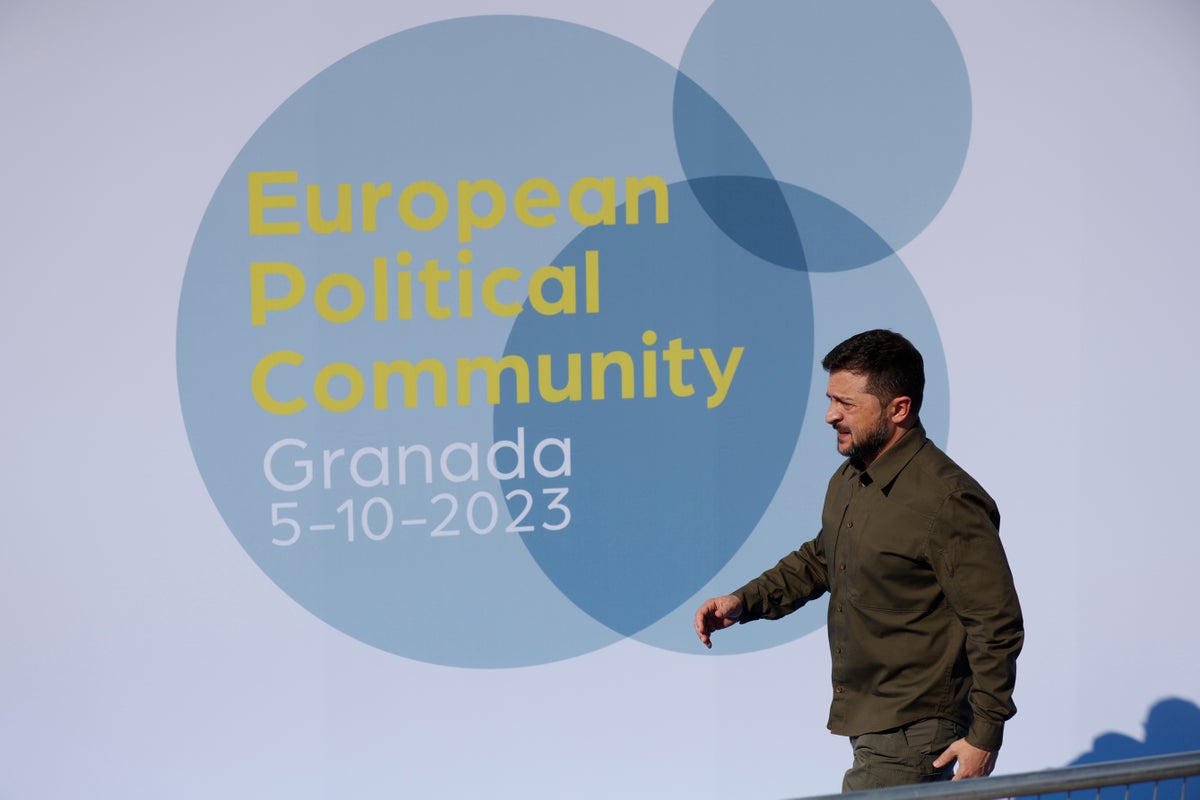
Almost 50 European leaders used a summit in the southern Spanish city of Granada on Thursday to stress they stand by Ukraine at a time when Western resolve appears somewhat weakened.
Ukrainian President Volodymyr Zelenskyy said that besides maintaining such unity, more military aid to get through the winter was just as essential.
Despite the political, economic and military support, the desperate struggle to rid Ukraine territory of invading Russian forces has ground to a stalemate, and Zelenskyy insisted that it was no time for wavering in the face of Russian President Vladimir Putin. And especially now that questions about continued support are growing in the United States too.
“Europe must be strong” despite what happens in other places around the globe, Zelenskyy said, calling for more air defense systems, artillery shells, long-range missiles and drones.
He said that victory or defeat in Ukraine would determine Europe's fate.
Zelenskyy flew in early in the morning to the third meeting of the European Political Community forum, which was formed in the wake of Russia’s full-scale invasion of Ukraine in February 2022 that drastically reset the continent’s political agenda and fundamentally undermined long-held beliefs on peace and stability on the continent.
Support from Europe has become all the more important after U.S. Congress hastily sent President Joe Biden legislation over the weekend that kept the federal government funded, but left off billions in funding for Ukraine’s war effort that the White House had vigorously backed.
Biden called other world powers on Tuesday to coordinate on Ukraine in a deliberate show of U.S. support at a time when the future of its aid is questioned by an important faction of Republicans who want to cut off money to Kyiv.
“The main challenge that we have that is to save unity in Europe,” Zelenskyy said.
Last weekend’s election in Slovakia, where pro-Russia candidate Robert Fico was the big winner, and Hungary’s continued recalcitrance to fully back Ukraine have cast increasing shadows on Europe's commitment. That counts especially for the European Union where many decisions on Ukraine need unanimity among the bloc's 27 members.
In Slovakia early this week, the president refused a plan by her country’s caretaker government to send further military aid to Ukraine, saying it doesn’t have the authority and parties that oppose such support are in talks to form a government following last week’s election.
On Thursday, though, the overall mood was supportive. Like most leaders, summit host and Spanish caretaker Prime Minister Pedro Sánchez stood firmly behind Ukraine and offered Zelenskyy a new package of anti-aircraft and anti-drone systems and training for Ukrainian soldiers to use them.
And just as Zelenskyy maintained a steadfast belief that the United States would come through with continued aid, EU leaders also felt U.S. issues could be overcome.
“I am very confident of support for Ukraine from the United States. What the United States is working on is the timing," European Commission President Ursula von der Leyen said.
Even if the EU promised to continue its support for Kyiv, it could never replace Washington's contribution if funds were to dry up there, EU foreign affairs chief Josep Borrell said.
“Everybody that doesn’t want Putin winning this war is to look for ways for the U.S. to retake this issue and continue supporting Ukraine," Borrell said. "Certainly we can do more. But the U.S. is something irreplaceable for the support of Ukraine.”
Zelenskyy insisted that Putin's attempts to divide the West would not cease.
"Russia will attack by information, disinformation, by fakes, etc.,” he said.
The EPC is an informal gathering so formal decisions are off the table, but the leaders want to use the format to push for better relations and seek to settle disputes, whether lingering or live.
That makes it especially disappointing that President Ilham Aliyev of Azerbaijan pulled out of the gathering at the last moment, when expectations had risen that a possible summit-within-the summit would unite key players and go-betweens in his country’s crisis with neighboring Armenia.
The humanitarian tragedy of some 100,000 Armenians fleeing Nagorno-Karabakh, a part of Azerbaijan with a predominantly Armenian population, followed a brutal military operation last month and touched a raw nerve in Europe.
Instead, officials said that many leaders will be huddling with Armenian Prime Minister Nikol Pashinyan to show backing for his government as it grapples with the humanitarian plight, and to try to lure Yerevan away from Moscow’s diplomatic grasp.







